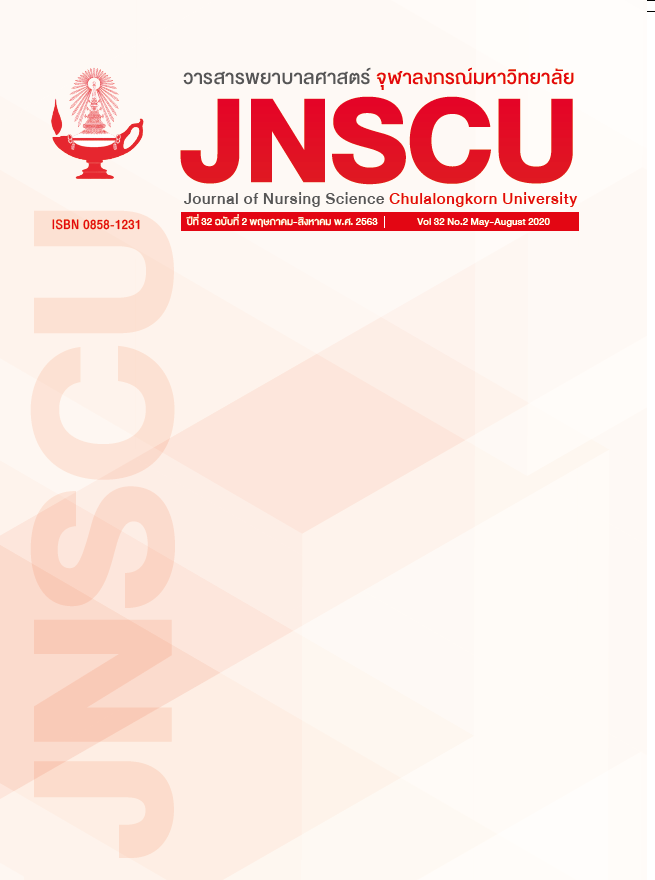การพัฒนาสมรรถนะพยาบาลวิชาชีพในการประเมินภาวะหลอดเลือดดำอักเสบในผู้ป่วยเด็กที่ใส่สายสวนทางหลอดเลือดดำส่วนปลาย ที่สถาบันสุขภาพเด็กแห่งชาติมหาราชินี
คำสำคัญ:
ภาวะหลอดเลือดดำส่วนปลายอักเสบในผู้ป่วยเด็ก, สมรรถนะการประเมินภาวะหลอดเลือดดำส่วนปลายอักเสบ, พยาบาลวิชาชีพบทคัดย่อ
วัตถุประสงค์การวิจัย: เพื่อพัฒนาสมรรถนะพยาบาลวิชาชีพในการประเมินภาวะหลอดเลือดดำส่วนปลายอักเสบ และศึกษาผลของการใช้รูปแบบการพัฒนาสมรรถนะพยาบาลวิชาชีพในการประเมินภาวะหลอดเลือดดำส่วนปลายอักเสบ
รูปแบบการวิจัย: การศึกษาครั้งนี้เป็นการวิจัยกึ่งทดลอง
วิธีดำเนินการวิจัย: กลุ่มตัวอย่าง คือ พยาบาลวิชาชีพ สถาบันสุขภาพเด็กแห่งชาติมหาราชินี เลือกแบบเฉพาะเจาะจง จำนวน 30 คน เครื่องมือที่ใช้ในการทดลอง คือ รูปแบบการพัฒนาสมรรถนะพยาบาลวิชาชีพฯ เก็บรวบรวมข้อมูลโดยใช้ 1) แบบวัดความรู้ 2) แบบประเมินทักษะ 3)แบบสอบถามความพึงพอใจและความมั่นใจในตนเอง วิเคราะห์โดยใช้สถิติเชิงพรรณนาและสถิติทดสอบที
ผลการวิจัย: 1) ได้รูปแบบการพัฒนาสมรรถนะพยาบาลวิชาชีพในการประเมินภาวะหลอดเลือดดำอักเสบในผู้ป่วยเด็ก 2) ผลการใช้รูปแบบฯ พบว่า พยาบาลวิชาชีพมีความรู้ หลังได้รับการพัฒนาเพิ่มขึ้น อย่างมีนัยสำคัญทางสถิติ p < .01 ทักษะการประเมิน และหลังการพัฒนา 3 เดือนสูงกว่าครั้งแรก อย่างมีนัยสำคัญทางสถิติ p < .01 ส่วนความพึงพอใจและความมั่นใจในตนเอง หลังพัฒนาและหลังการพัฒนา 3 เดือน ไม่มีความแตกต่างกัน
เอกสารอ้างอิง
1. Taylor J, Implementing an Evidence-Based Practice Project in the Prevention of Peripheral Intravenous Site Infiltrations in Children. Journal of Infusion Nursing 2015; 38 (16).
2. Bolton D, Clinically indicated replacement of peripheral cannulas. British Journal of Nursing [Internet]. 2015 [cited 2019 Jun 15]; 24(19): S4-S12. Available from: https://pubmed.ncbi.nlm.nih.gov/26496876/
3. Danski, M. T. R., Mingorance, P., Johann, D. A., Vayego, S. A., & Lind, J. Incidence of local complications and risk factors associ-ated with peripheral intravenous catheter in neonates. Journal of School of Nursingt Revista Da Escola de Enfermagem DA USP [Internet]. 2016 cited 2019 Feb 6]; 50(1): 22-28. Available from:
https://www.researchgate.net/publication/298725396_Incidence_of_local_complications_and_risk_factors_associated_with_peripheral_intravenous_catheter_in_neonates
4. Garland, JS, Dunne, W Jr, Havens, P, Hintermeyer, M, Bozzette, MA, Wincek, J, et al. Peripheral intravenous catheter complications in critically ill children: a prospective study. Pediatrics 1992; 89(6 Pt 2): 1145–1150.
5. Vallaree AM, Binoy VS, Somashekhar MN, Ajay GP, Dipen VP, and Archana SN. Educational intervention to improve intravenous cannulation skills in paediatric nurses using low-fidelity simulation: Indian experience; 2017 [cited 2020 Feb 6]. Available from: https://bmjpaedsopen.bmj.com/content/bmjpo/1/1/e000148.full.pdf.
6. Iamsamang C. Active Learning: Guidelines for learning management for learners in the 21st Century. [Internet]. 2015 [cited 2019 Jun 15]. Available from: http://chitnarongactivelearning.blogspot.com/2015/09/active-learning-21.html
7. Higginson, R. & Parry, A. Phlebitis: Treatment, care and prevention. Nursing Times 2011; 107(36): 18-21.
8. La Rue G, Peterson M (2011) The impact of dilution on intravenous therapy. Journal of Infusion Nursing: 34, 2, 117–123
9. Jackson, A. Reflecting on the nursing contribution to vascular access. British Journal of Nursing 2003; 12(11): 657 – 665.
10. Jefferies PR. A framework for designing, implementing, and evaluating simulations used as teaching strategies in nursing. Nurs Educ Perspect 2005; 26: 96-103.
11. Kemmis, S. and McTaggart, R. The Action Research Reader. 3rd ed. Deakin University Press, Victoria; 1988.
12. Jeffries, PR., & Rogers, K. J. Evaluating Simulations. In P. R. Jeffries (Ed.), Simulation in nursing education: From conceptualization to evaluation 2007.. New York: National League for Nursing. (pp. 87-103).
13. Sawatsalee C. Manual of professional trainers: The effective of training management.
Bangkok: Welfare of Office of the Civil Service Commission. 2007.
14. Suwannakeeree W, Jullmusi O and Tangkawanich T. Simulation-Based Learning Management for Nursing Students. Journal of Nursing Science Chulalongkorn University 2016; 28 (2): 1 – 14.
15. Kamanee T. Science of Teaching: Knowledge of Efficient Learning Process Management. 17th ed. Bangkok: Chulalongkorn University printing press. 2013.
16. Lertbunnaphong T. Simulation Based Medical Education. Siriraj Medical Bullentin. 2015; 8(1): 39-46.
17. Thangkratok P, Supasiri T, Jungvanichar N, Chiachuabsilp A, Tannukit P and Pongpirul K. Determination of Infusion Phlebitis from Peripheral Intravenous Catheter from Nurse Perspective. Journal of Nursing Science Chulalongkorn University 2019; 31 (1): 98 – 108.
เผยแพร่แล้ว
ฉบับ
ประเภทบทความ
สัญญาอนุญาต
ลิขสิทธิ์ (c) 2022 วารสารพยาบาลศาสตร์ จุฬาลงกรณ์มหาวิทยาลัย

อนุญาตภายใต้เงื่อนไข Creative Commons Attribution-NonCommercial-NoDerivatives 4.0 International License.
##default.contextSettings.thaijo.licenseTerms##


